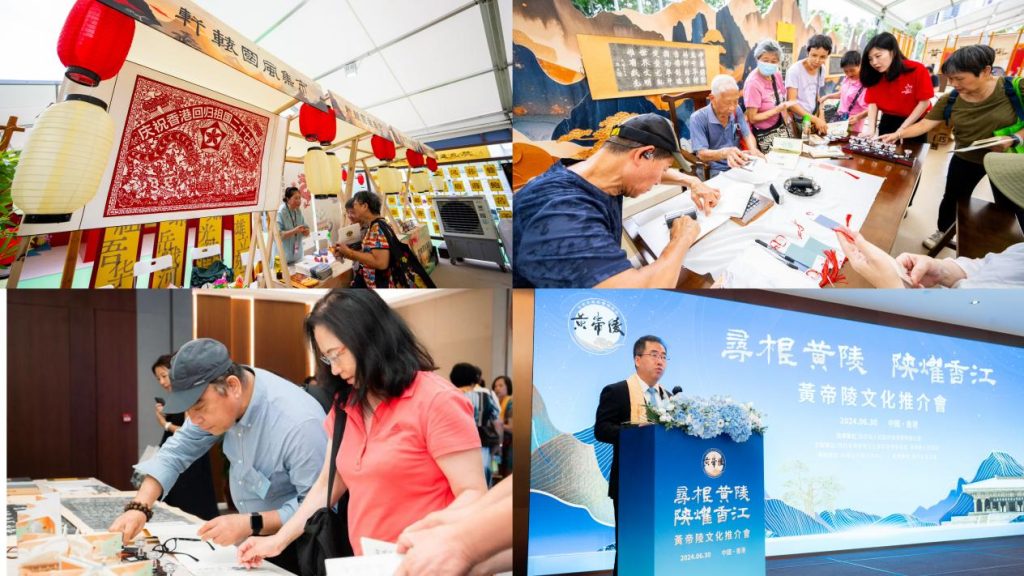Cultural exhibition on the Mausoleum of Huangdi held in Hong Kong to highlight shared Chinese roots
Hong KongHong Kong, July 1, 2024 /Xinhua-AsiaNet/
A launching ceremony marking the 27th anniversary of Hong Kong’s return to the motherland was held in Victoria Park of Hong Kong on June 29, kicking off a series of celebration activities organized by the Hong Kong Celebrations Association.
The exhibition on the culture of the Mausoleum of Huangdi attracted a large number of Hong Kong citizens, which offers them a glimpse into the northwest China’s Shaanxi Province, where the mausoleum is located, and enables them to feel the charm of excellent traditional Chinese culture. The administrative committee of Huangdi Mausoleum cultural park and the government of Huangling County organized a cultural promotion event on June 30 at the Grand Center in Hong Kong.

Image: Cultural exhibition on the Mausoleum of Huangdi and a cultural promotion event was held in Hong Kong.
Huangdi, also known as the Yellow Emperor, blazed the trail and laid the foundation of the splendid civilization of the Chinese nation. He is considered the progenitor of Chinese culture. According to “Records of the Grand Historian,” after Huangdi’s passing, he was buried in Qiaoshan Mountain. The Mausoleum of Huangdi is located at the peak of Qiaoshan Mountain in Huangling County, Shaanxi Province.
The Mausoleum of Huangdi is a spiritual symbol of Chinese civilization, revered by Chinese both at home and abroad. It serves as a sacred place for the Chinese diaspora worldwide to reconnect with their roots and honor their ancestors.
The cultural exhibition covers an area of over 200 square meters. The exhibition focuses on the theme of Huangdi and the culture surrounding his mausoleum. It includes various sections such as thematic displays with pictures and texts, exhibitions of inscriptions and stone carvings, and showcases of black pottery artworks.
The exhibition aims to introduce the remarkable achievements of Huangdi, showcase the historical rituals and ceremonies dedicated to him throughout different periods, and tell the story of the inheritance of Chinese civilization. Furthermore, it seeks to promote cultural tourism related to the Mausoleum of Huangdi.
In the exhibition, many precious cultural elements of the Mausoleum of Huangdi, such as the replicas of the Xuanyuan Hall, the statue of Huangdi, the cypress tree planted by Huangdi himself, and the inscriptions in the mausoleum, appear in Victoria Park. With the main focus on inheriting the Huangdi culture and keeping the Chinese roots culture alive, this immersive exhibition offers visitors an opportunity to experience Chinese culture and trace their cultural heritage.
The exhibition hall also features a variety of interactive experiences, allowing visitors to participate in activities such as seeking blessing, tracing the origins of family names, hanging wishing plaques on the cypress tree planted by Huangdi, ink rubbings, and collecting stamps.
Calligraphy artists and intangible cultural heritage inheritors from Huangling County are invited to write calligraphy on site and create traditional Huangling paper-cutting and dough flower artworks, allowing Hong Kong citizens to personally experience the profound traditional culture and foster a sense of cultural kinship.
In a bid to showcase China in various perspectives, this year’s celebration campaign has featured the participation of various provinces and cities in China, as well as relevant organizations and enterprises, which will present a panoramic display of the beautiful vision of China’s modernization and to celebrate the joy of the return to the motherland. The exhibition will run for four days until July 2.
Through exhibitions, interactive experiences of intangible cultural heritage, and cultural promotions, the event showcased the profound cultural heritage of Huangdi and the splendid image of Shaanxi, aiming to enhance cultural exchanges and tourism partnership between Hong Kong and Shaanxi, and further expand the scope of cooperation and communication between the two places.
